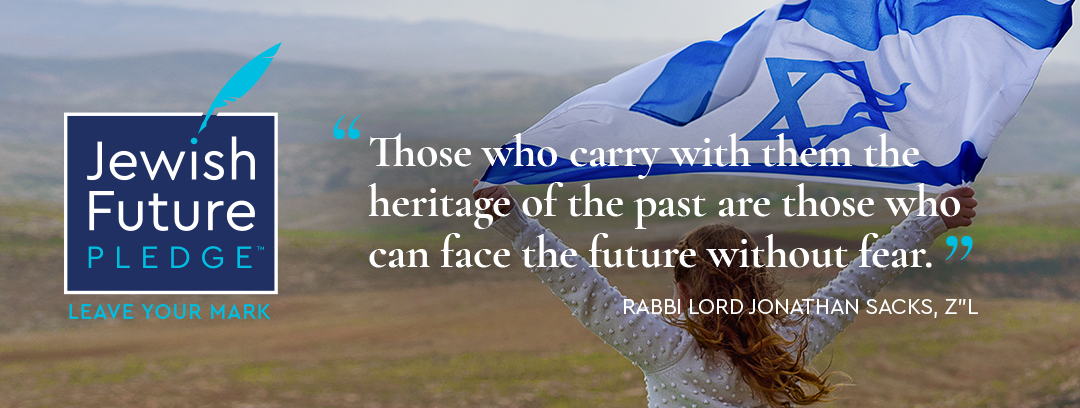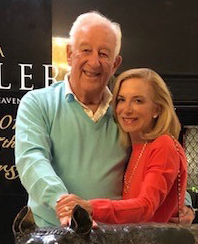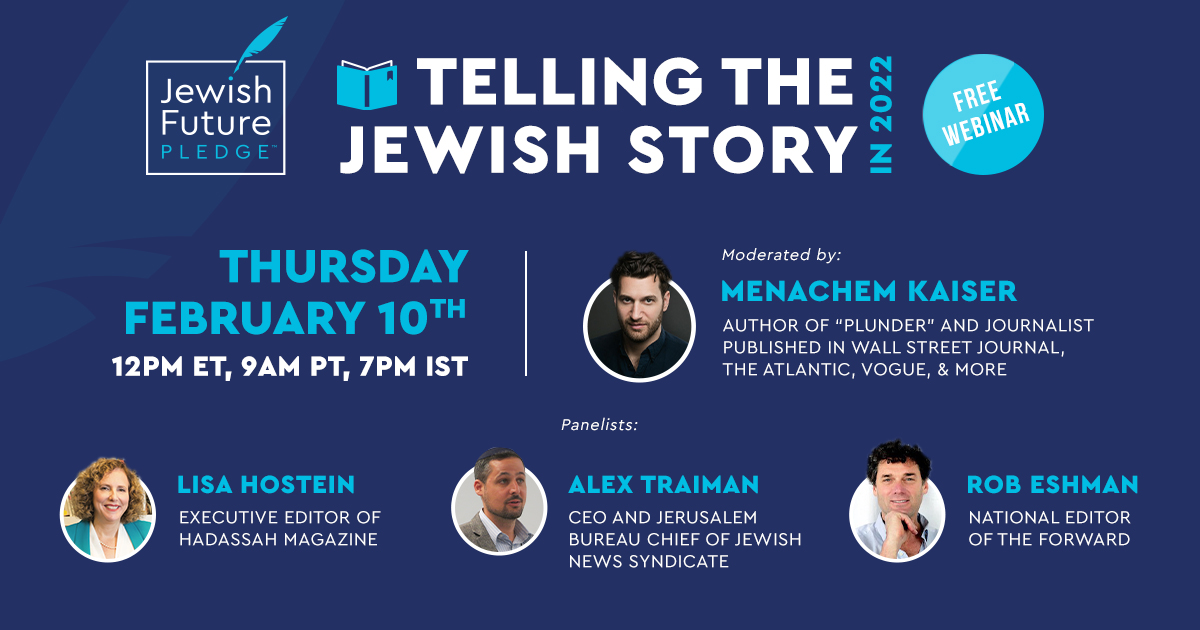
Welcome to the February edition of the Jewish Future Pledge newsletter. We hope that this newsletter finds our community healthy and safe. Pledges to date: We’re excited to share that the Jewish Future Pledge currently has 4,029 pledgers, and the Jewish Youth Pledge reached a milestone of 5,085 youth pledgers! Click here to take the pledge. In this edition: - Etta Zimmerman, board member of the American Jewish Joint Distribution Committee (JDC), reflects on how the Pledge helped cement her family’s philanthropic values, including her children’s community involvement.
- Explore insights from Freewill.com on common myths about making a will and learn what practical steps you can take today.
- Everything new and newsworthy at the Jewish Future Pledge, including how the next generation is approaching how and where they give.
Pledger Spotlight: Etta Zimmerman
Boca Raton, Florida
 What did you think when you first heard about the Jewish Future Pledge and why did you ultimately sign? What did you think when you first heard about the Jewish Future Pledge and why did you ultimately sign?
By the time we heard of Mike Leven’s concept for the Jewish Future Pledge, my husband and I had already solidified our family’s Jewish charitable giving in our estate planning. We chose to take the Pledge because it allowed us to publicize what we had already done privately. The Jewish Future Pledge inspired us to publicly share a commitment we had already made, in the hopes that it would send a greater message to our family and community. How have you taught your children about philanthropy? It’s second nature in our family— our children got involved very organically. I am lucky that my husband Raymond modeled philanthropic values for our children, and I would say he bears the responsibility for how successful they have been in their philanthropic journey. They grew up seeing family members take on responsibility, both in the Jewish community and community at large. By the time I married into the family, they were naturally assuming leadership positions in their synagogues and Federations. For our youngest child and our grandsons, we have taken them along on our philanthropic journey, whether it was delivering food packages in our community, traveling to remnants of post-Holocaust Jewish communities across Europe to see needs that exist today, or visiting Israel to build a genuine sense of responsibility to the Jewish community. What is one Jewish value you carry with you in your daily life? One Jewish value that I think is central to our family is kol yisrael arevim zeh bazeh–every Jew is responsible for one another. My husband and I both strongly feel this responsibility as a Jewish value–but that it applies to both Jews and non-Jews. Whether it's caring for senior citizens eight minutes north of us in a retirement community living on fixed incomes, or somebody who lives in the former Soviet Union living in substandard conditions. We have an equal sense of compassion and responsibility for each person. Etta Gross Zimmerman is the proud daughter of a Holocaust Survivor. She served on the National Women’s Philanthropy Board of the Jewish Federations of North America before becoming the Chair of the Board for the South Palm Beach Jewish Federation from 2005 to 2007. She has been an active board member of the American Jewish Joint Distribution Committee (JDC) for over a decade. During her board service, she served in Resource Development Leadership and Leadership on the Former Soviet Union Committees. Etta is currently a Vice President and chairs the Nominating Committee. Etta and her husband Raymond live in Boca Raton and are parents to three children, and the proud grandparents of four grandchildren.
How To: Debunk Myths about Making a Will A will is an important estate planning tool, and all adults should have one. Though, for many people, writing a will seems like a complex, daunting process. Let’s clear up a few common myths about writing your will. Myth: “I don’t own a lot, so I don’t need a will.” Wills aren’t just for the wealthy. There are many important reasons to have a will, and passing on your money and property is only one of them. With a will, you can choose guardians for your minor children, establish a power of attorney, write your funeral wishes, and more. Myth: “My family knows my wishes, so I don’t need a will.” Even if your family knows what you want — and they might know less than you think — they can’t make decisions for you if you pass away without a will. Instead, a court will make those decisions based on your state’s intestacy laws. Court proceedings can be long and cost your loved ones a lot of money from your estate. Also, you might want your assets distributed differently than how the court would distribute them. Myth: “I need a lawyer to write a will.” If you have a complex family or financial situation, you might benefit from hiring an attorney to help you draft your will. But most people can write their own will. As long as you follow the proper guidelines, a do-it-yourself will be just as valid as one prepared by a lawyer. Myth: “I already have a will, so I don’t have to think about it anymore.” Having a will is a great first step — but it’s only useful to you and your loved ones if you keep it up to date. Your circumstances, relationships, and wealth will likely change throughout your life. Estate attorneys recommend updating your will every three to five years, or whenever you have a major life event. Maybe there’s a cause that’s grown close to your heart, and you want to add a charity as a beneficiary in your will. By updating your will, you make sure it always reflects your most current wishes. Myth: “I’m too young to need a will.” It’s never too early to have a will! If you’re older than 18, it’s a good idea to have one, especially if you own property, pets, or have children. None of us can predict the future, and we don’t know how long our lives will be. Having a will can give you the peace of mind that, no matter what happens, you’ve put your affairs in order and protected your loved ones. This How To was adapted from Free Will’s Top 10 Myth about Making a Will.
New and Newsworthy 
 2 New Studies Aim to Show Nonprofits What Appeals to Donors Most, Philanthropy.com 2 New Studies Aim to Show Nonprofits What Appeals to Donors Most, Philanthropy.com
Two new studies from the Lilly Family School of Philanthropy make the case for nonprofits to boost investments in technology, including video and social media, to attract and retain donors. While researchers have long known that donors value information about the impact of their gifts, the new studies indicate that donors’ expectations of that kind of feedback is increasing and becoming more sophisticated.  “Next-Gen” Philanthropists Are Coming Into Their Own. Here’s How They Approach Giving, Inside Philanthropy “Next-Gen” Philanthropists Are Coming Into Their Own. Here’s How They Approach Giving, Inside Philanthropy
The consulting firm Accenture estimates that today’s boomer and Silent Generation wealth-holders will gift their heirs up to $30 trillion by 2030, and a large proportion of that wealth will be concentrated in a small upper class. New philanthropic heirs often come into vast wealth in their 40s, 30s, or even younger, and in many cases, become active in philanthropy right away. They also tend to approach philanthropy differently than their parents did. “The accelerated wealth through tech—early inheritance and early accumulation—is putting hundreds of millions and billions into the hands of young people. The result for philanthropy is, you see more of a willingness to take a risk. You see more learning while doing: take a risk; if it doesn’t work out, go on to something else. Whereas there used to be a predisposition to incrementalism or funding the big, tested organizations.”  Telling the Jewish Story in 2022 Telling the Jewish Story in 2022
On February 10, the Jewish Future Pledge hosted a webinar with key players in Jewish media on the successes and shortfalls of Jewish reporting in recent years. This event was moderated by Menachem Kaiser, author of “Plunder,” and a nationally renowned writer featured in Wall Street Journal, The Atlantic, Vogue, and more. The event featured panelists, Alex Traiman, CEO of Jewish News Syndicate, Lisa Hostein, Executive Editor of Hadassah Magazine, and Rob Eshman, National Editor of The Forward. Missed it? Watch it here! | 